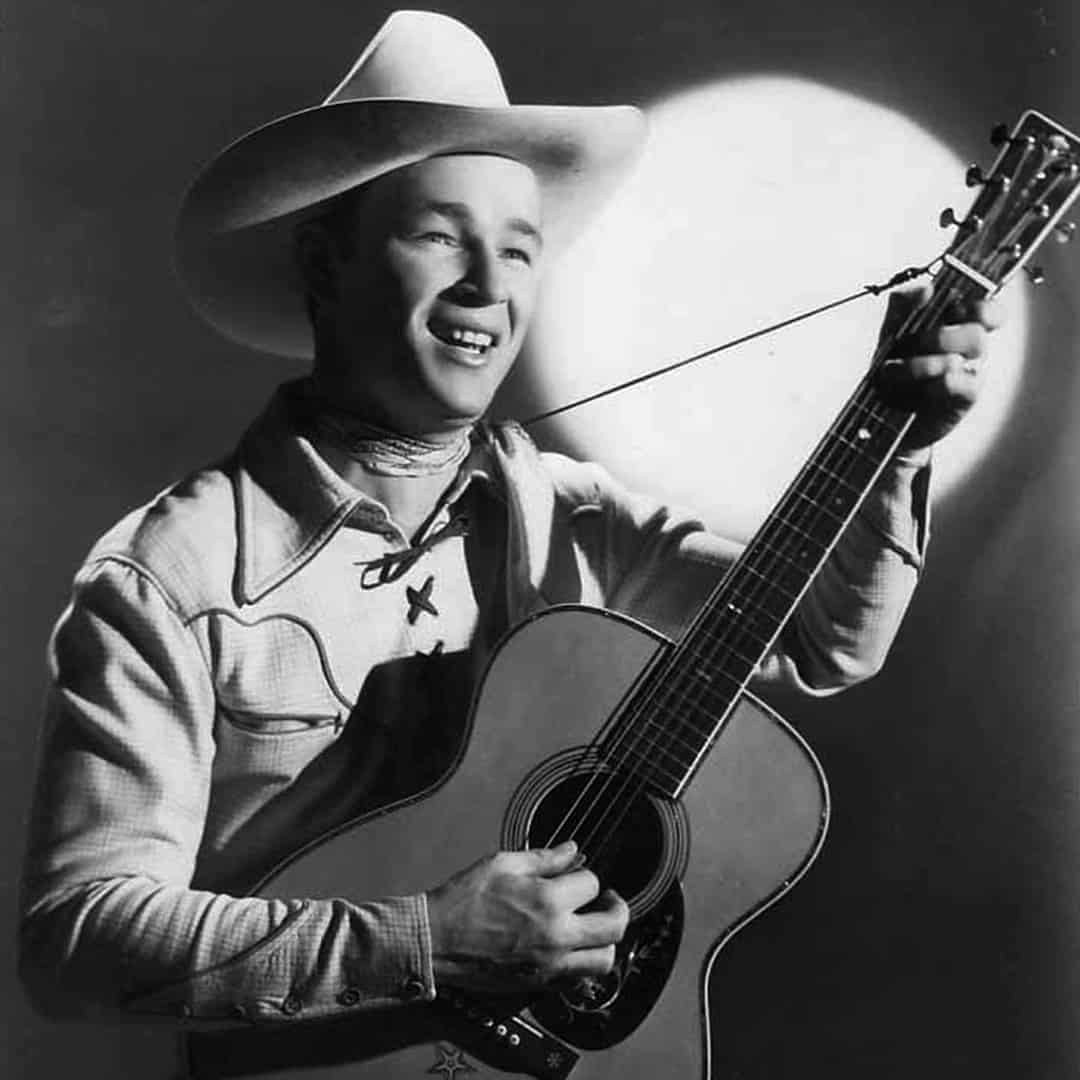Gene
Autry

-
Inducted1969
-
Born
September 29, 1907
-
Died
October 2, 1998
-
Birthplace
Tioga, Texas
While unquestionably the best-selling country & western artist from the onset of the Great Depression through the close of World War II, Gene Autry was so much more. His status as a top box-office attraction of Hollywood westerns brought his music to the attention of a vast audience otherwise unfamiliar with country music. In addition, his success as a singing cowboy launched an entire genre of movies and paved the way for successful rivals such as Roy Rogers and Tex Ritter.
Early Life and Career
Orvon Gene Autry, the grandson of a Baptist minister, was born in a farmhouse near Tioga, Texas and first performed as a boy soprano in his grandfather’s church choir. Subsequently, Autry mastered a $12 Sears mail-order guitar, which he used to accompany his singing at local events. When the Autry family moved to Oklahoma, young Gene took a job as relief telegrapher for the St. Louis & Frisco railroad, where he eventually met Jimmy Long, an older fellow-railroader who also played music on the side and aspired to make commercial recordings. Inspired by Long (and possibly by a chance encounter with humorist Will Rogers), nineteen-year-old Autry took a leave of absence from his job to make the rounds of New York City record companies, auditioning with his versions of contemporary Gene Austin and Al Jolson hits.
Befriended by fellow Oklahomans Johnny and Frankie Marvin, then pop singers performing and recording in New York, Gene made test records for Edison and Victor, but was urged to return home and gain experience as a performer. He spent two years (1928–1929) on Tulsa’s KVOO, billed as “Oklahoma’s Yodeling Cowboy” and singing Jimmie Rodgers’s then-current hits before returning to New York in October 1929, just days before the Stock Market crashed. He began recording with a vengeance, cutting masters for five different companies, each of which issued his sides on multiple labels for chain-store distribution.
Songs
00:00 / 00:00
00:00 / 00:00
00:00 / 00:00
Recording and Movie Stardom
For two years, Autry recorded prolifically, covering Rodgers’s hits and performing other songs in a similar style. Ironically, stardom came the first time he broke away from the Rodgers mold, recording “Silver Haired Daddy of Mine” in late October 1931, as a duet with Jimmy Long for the American Record Corporation (ARC) family of labels and its A&R man Art Satherley. Lilting and sentimental in the tradition of the turn-of-the-century parlor ballad, the song became a major hit and propelled Autry to a radio career on Chicago’s WLS, beginning with his first morning broadcast on December 1, 1931, on his own show, Conqueror Record Time . Urged by Satherley, Autry adopted cowboy attire and focused on western songs, cutting his first ones in 1933. In addition, WLS announcer Anne Williams created skillful word-pictures building Autry’s cowboy image, which was reinforced by his hit recordings of “The Last Roundup” and “Cowboy’s Heaven.”
In the summer of 1934, Gene and his wife, Ina (Jimmy Long’s niece), and his friend Lester “Smiley” Burnette, musician-composer-comedian with the Autry radio troupe, drove to California, where the singing cowboy made a guest appearance in the Republic Pictures western movie, In Old Santa Fe. His own series of films began the following year (with the science fiction serial The Phantom Empire), and by 1937, exhibitors voted Autry the #1 box-office attraction in westerns.
Fueled by Autry’s popular films, his hit records abounded. Among them were “Tumbling Tumbleweeds,” “Mexicali Rose,” “Take Me Back to My Boots and Saddle,” “Gold Mine in the Sky,” “South of the Border (Down Mexico Way),” and his theme song, “Back in the Saddle Again.” His smooth, relaxed baritone voice extended his appeal to devotees of mainstream pop music, while the down-home warmth of his delivery assured members of the country audience that was one of them. The virtual antithesis of many of today’s vocalists, Autry adhered to the melody line with a total absence of vocal gymnastics or bluesy embellishments, with his clear, straightforward singing evoking both sincerity and serenity.
Autry’s screen presence, as gentle and reassuring as his singing style, offered both comfort and inspiration to a Depression-weary audience. Invariably cast as himself—that is, Gene Autry—a good-natured and unassuming country singer, he was no swaggering superhero, but rather a guileless young man who triumphed against all odds by virtue of his innate goodness. Charismatic and handsome astride his horse, Champion, Autry sprinkled his movies with music, humor (Smiley Burnette was his regular comic sidekick), and a minimum of gunplay. In 1940, Autry was voted the fourth most popular Hollywood star, out-polling even Tyrone Power and James Cagney.
Charismatic and handsome astride his horse, Champion, Gene Autry sprinkled his movies with music, humor, and a minimum of gunplay.
Videos
“Utah Trail”
“In Old Santa Fe”
Photos
-
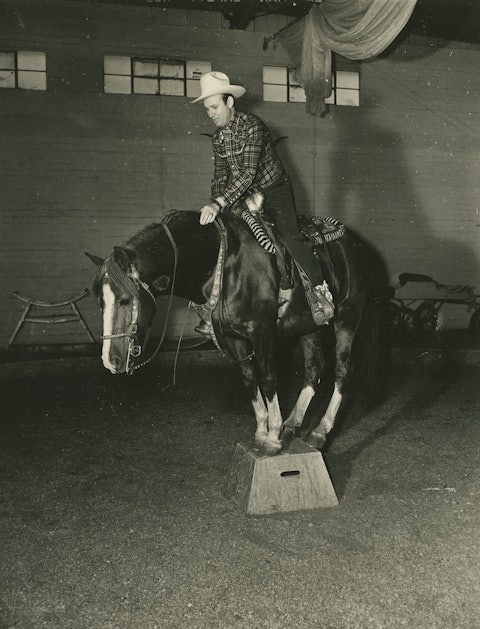
Gene Autry performing a trick with his horse, Champion, 1937.
-
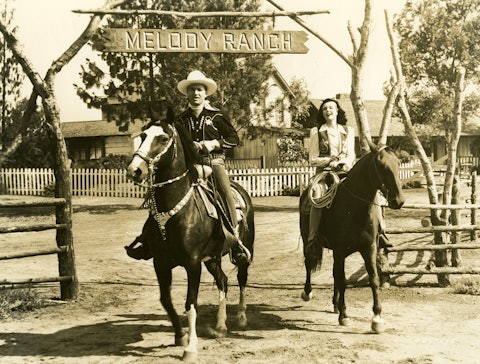
Publicity photo of Gene Autry and Ann Miller in the 1940 Republic Pictures film Melody Ranch.
-
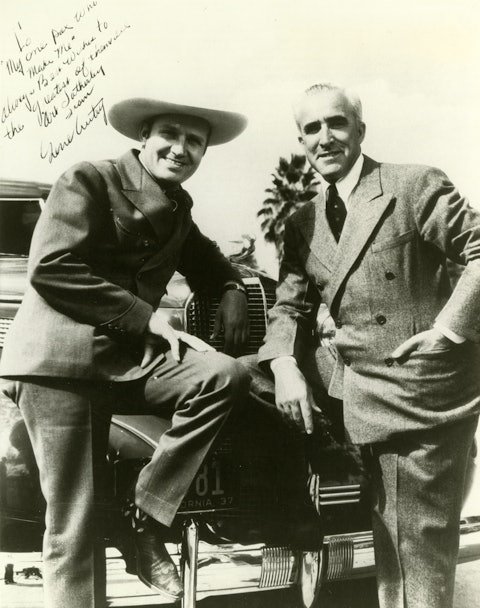
A 1937 photo of Gene Autry (left) and his A&R man, Art Satherley, posing in front of a car. Autry inscribed the photo to Satherley, describing him as “my one pal who made me.”
-
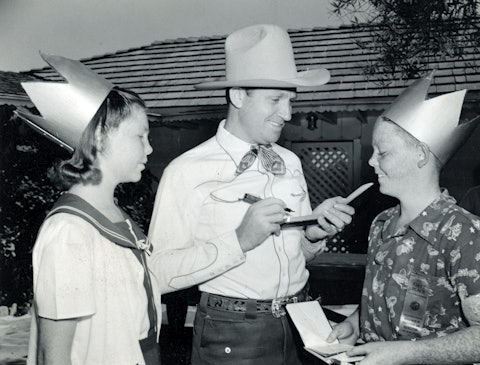
Gene Autry signing autograph books for two young fans, 1940.
-
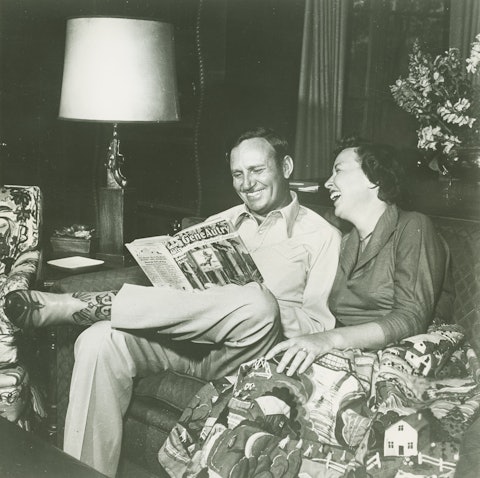
Gene Autry and his wife, Ina, in the living room of their San Fernando Valley, California, home, 1953.
-
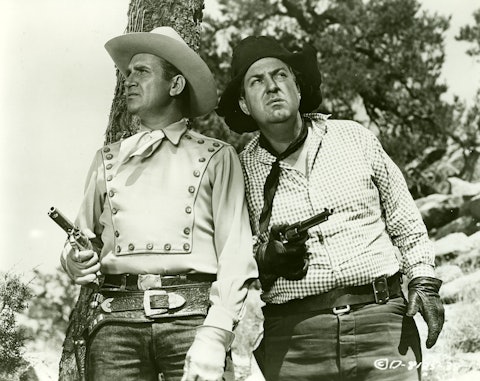
Movie still of Gene Autry and Smiley Burnette in an unidentified western film, c. 1940s.
-
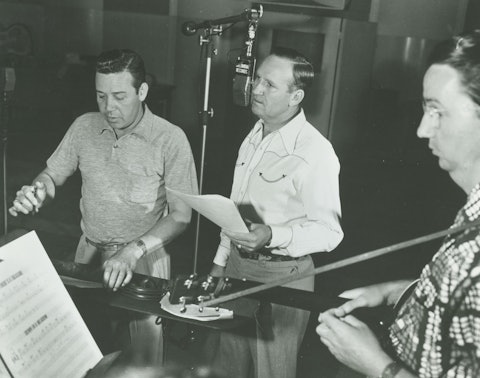
Gene Autry at a recording session for Columbia Records, c. 1940s.
-
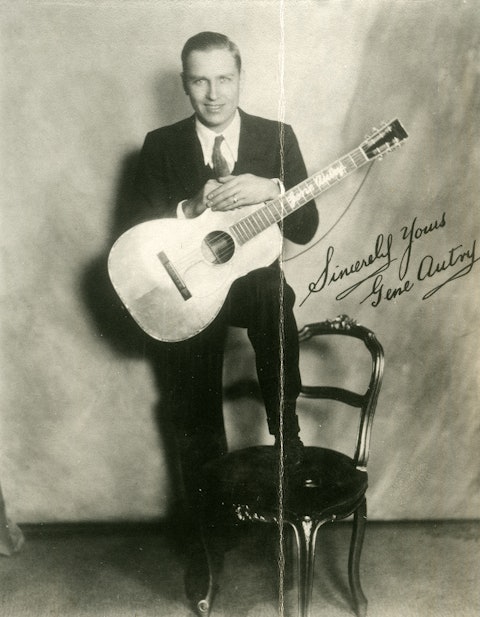
A signed publicity photo of Gene Autry with a guitar, c. early 1930s.
-
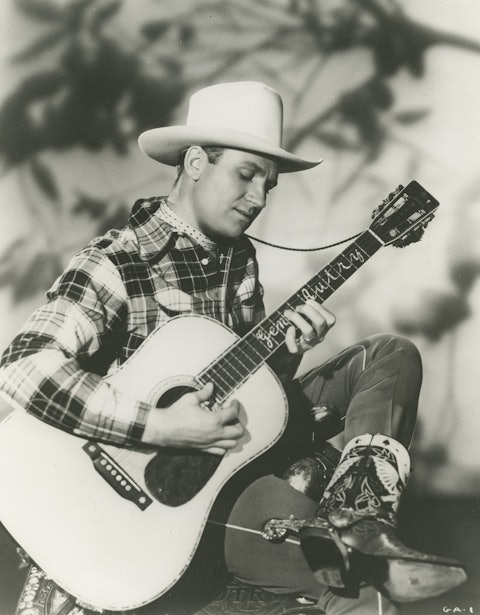
Publicity photo of Gene Autry playing his guitar, 1935.
-
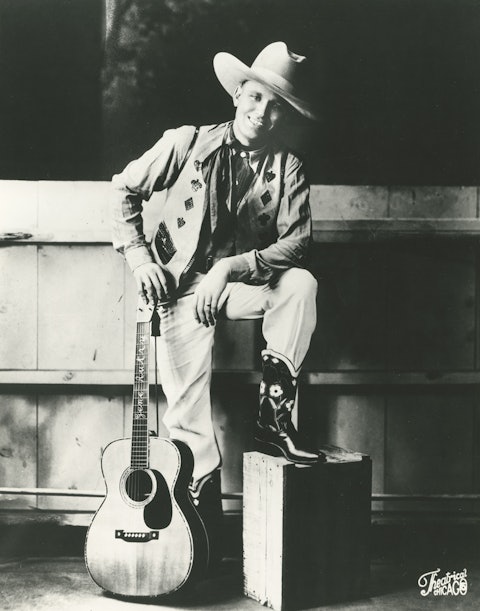
WLS National Barn Dance publicity photo of Gene Autry, c. early 1930s.
Holiday Classics, Television Career, and Later Life
Wrigley sponsored Autry’s CBS radio series, Melody Ranch, from 1940 through 1956, which was interrupted only by Autry’s service in the Army Air Corps during World War II (he joined voluntarily on July 26, 1942, during a Melody Ranch broadcast and served as a transport plane pilot in the Pacific Theater for three years). The postwar years brought more million-selling records, including “Here Comes Santa Claus” (1947), “Rudolph, the Red-Nosed Reindeer” (1949), “Peter Cottontail,” and “Frosty the Snow Man” (both 1950). Autry produced his own feature films from 1947 through 1953 and, shrewdly judging the importance of the new medium of television, became the first major star to appear in his own filmed TV series. The Gene Autry Show, produced by Autry’s Flying A Productions, was sponsored on CBS-TV by Wrigley from July 23, 1950, through August 7, 1956.
Fulfilling a lifelong dream, Autry became owner of the Los Angeles (later California) Angels baseball team in December 1960. Although he performed sporadically over the next five years, he left the field before country singers’ personal appearances were termed “concerts” and before it became commonplace to attribute artistic genius to country or rock artists. Lavish praise for his talent and his impact on our popular culture has been slow in coming, but well after his death, on October 2, 1998, he continued to be idolized by generations, including many younger country singers who patterned their lives after his and cheered his 1969 induction into the Country Music Hall of Fame.
—Jonathan Guyot Smith
Adapted from the Country Music Hall of Fame® and Museum’s Encyclopedia of Country Music, published by Oxford University Press.


